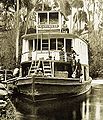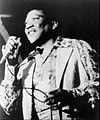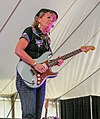Portal:Blues
The Blues Portal

Blues is a music genre and musical form that originated amongst African-Americans in the Deep South of the United States around the 1860s. Blues incorporated spirituals, work songs, field hollers, shouts, chants, and rhymed simple narrative ballads from the African-American culture. The blues form is ubiquitous in jazz, rhythm and blues, and rock and roll, and is characterized by the call-and-response pattern, the blues scale, and specific chord progressions, of which the twelve-bar blues is the most common. Blue notes (or "worried notes"), usually thirds, fifths or sevenths flattened in pitch, are also an essential part of the sound. Blues shuffles or walking bass reinforce the trance-like rhythm and form a repetitive effect known as the groove.
"The Blues" is characterized by its lyrics, bass lines, and instrumentation. Early traditional blues verses consisted of a single line repeated four times. It was only in the first decades of the 20th century that the most common current structure became standard: the AAB pattern, consisting of a line sung over the four first bars, its repetition over the next four, and then a longer concluding line over the last bars. Early blues frequently took the form of a loose narrative, often relating the racial discrimination and other challenges experienced by African-Americans.
Many elements, such as the call-and-response format and the use of blue notes, can be traced back to the music of Africa. The origins of the blues are also closely related to the religious music of the Afro-American community, the spirituals. The first appearance of the blues is often dated to after the ending of slavery, with the development of juke joints occurring later. It is associated with the newly acquired freedom of the former slaves. Chroniclers began to report about blues music at the dawn of the 20th century. The first publication of blues sheet music was in 1908. Blues has since evolved from unaccompanied vocal music and oral traditions of slaves into a wide variety of styles and subgenres. Blues subgenres include country blues, Delta blues and Piedmont blues, as well as urban blues styles such as Chicago blues and West Coast blues. World War II marked the transition from acoustic to electric blues and the progressive opening of blues music to a wider audience, especially white listeners. In the 1960s and 1970s, a hybrid form called blues rock developed, which blended blues styles with rock music. (Full article...)
Selected article -
Dirty blues (also known as bawdy blues) is a form of blues music that deals with socially taboo and obscene subjects, often referring to sexual acts and drug use. Because of the sometimes graphic subject matter, such music was often banned from radio and available only on jukeboxes. The style was most popular in the years before World War II, although it experienced a revival in the early 1950s.
Many songs used innuendo, slang terms, or double entendres, such as Lil Johnson's "Press My Button (Ring My Bell)" ("Come on baby, let's have some fun / Just put your hot dog in my bun"). However, some were very explicit. The most extreme examples were rarely recorded at all, a notable exception being Lucille Bogan's obscene version of "Shave 'Em Dry" (1935), which Elijah Wald has noted as "by far the most explicit blues song preserved at a commercial pre-war recording session". (Full article...)Selected picture
Quotes
| “ | Blues is really America's finest art form and most dominant art form of the 20th century. | ” |
| — Georgie Fame | ||
| “ | Blues is a natural fact, something that a fellow lives. If you don't live it, you don't have it. | ” |
| — Big Bill Broonzy | ||
| “ | The blues is a low-down achin' heart disease Like consumption killing me by degrees. |
” |
| — Robert Johnson, "Preaching Blues (Up Jumped the Devil)" | ||
| “ | When you lay down at night, turning from one side of the bed to the other and can't sleep, what's the matter? Blues got you. | ” |
| — Lead Belly | ||
| “ | The blues had a baby and they named it rock and roll. | ” |
| — Muddy Waters | ||
Selected biography -
Robert Leroy Johnson (May 8, 1911 – August 16, 1938) was an American blues musician and songwriter. His landmark recordings in 1936 and 1937 display a combination of singing, guitar skills, and songwriting talent that has influenced later generations of musicians. Although his recording career spanned only seven months, he is recognized as a master of the blues, particularly the Delta blues style, and as one of the most influential musicians of the 20th century. The Rock and Roll Hall of Fame describes him as perhaps "the first ever rock star".
As a traveling performer who played mostly on street corners, in juke joints, and at Saturday night dances, Johnson had little commercial success or public recognition in his lifetime. He participated in only two recording sessions, one in San Antonio in 1936, and one in Dallas in 1937, that produced 29 distinct songs (with 13 surviving alternate takes) recorded by Don Law. These songs, recorded solo in improvised studios, were the totality of his recorded output. Most were released as 10-inch, 78 rpm singles from 1937–1938, with a few released after his death. Other than these recordings, very little was known of his life outside of the small musical circuit in the Mississippi Delta where he spent most of his time. Much of his story has been reconstructed by researchers. Johnson's poorly documented life and death have given rise to legends. The one most often associated with him is that he sold his soul to the devil at a local crossroads in return for musical success. (Full article...)General images -
Things to do
Tasks template
 |
Here are some tasks awaiting attention:
|
- –When a task is completed, please remove it from the list.
WikiProjects
Categories
Related portals
Wikimedia
The following Wikimedia Foundation sister projects provide more on this subject:
-
Commons
Free media repository -
Wikibooks
Free textbooks and manuals -
Wikidata
Free knowledge base -
Wikinews
Free-content news -
Wikiquote
Collection of quotations -
Wikisource
Free-content library -
Wikispecies
Directory of species -
Wikiversity
Free learning tools -
Wikivoyage
Free travel guide -
Wiktionary
Dictionary and thesaurus





































































































